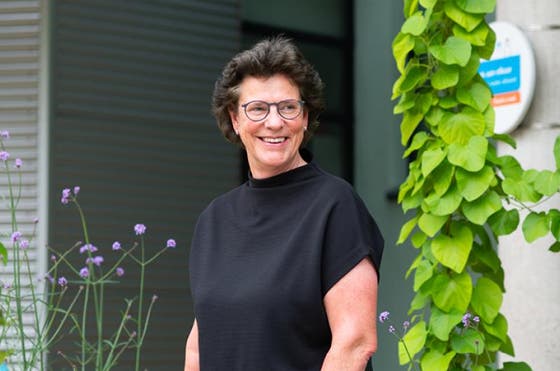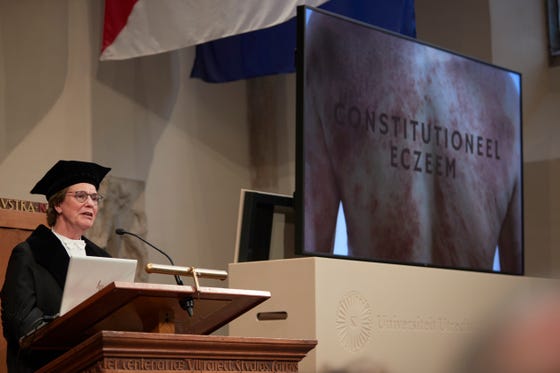Apr 25: "Building bridges": inaugural lecture by prof. Marjolein de Bruin-Weller

On Tuesday, April 18, 2023, Marjolein de Bruin-Weller, professor of atopic dermatitis, delivered her inaugural lecture in Utrecht. In her speech, she discussed the significant progress that has been achieved in the treatment of patients with atopic dermatitis. Scientific research at UMC Utrecht under her leadership has yielded a great deal of knowledge in recent years, enabling prescribers to match the right medicine to the individual patient better than before, with optimal dosage and duration of treatment.
Atopic dermatitis (AD) is the most common chronic inflammatory skin disease. About half a million people in the Netherlands suffer from AD. The majority of them are children; as many as one in five young children suffer from AD and some of them remain affected for life. In addition, patients have an increased risk of other atopic diseases, such as asthma, hay fever and food allergy. AD has a major impact on one's quality of life. The main complaint is the itching, which is often present day and night. Nighttime itching leads to poor sleep, daytime fatigue and reduced work and school performance. The visibility of the eczema, often present on the face and hands, can lead to stigma and problems with relationships and finding work. Anxiety and depression, and even suicide attempts, are relatively common in patients with AD.
Customized treatment
Marjolein de Bruin-Weller has been involved in AD patient care and research for more than 25 years. Whereas until a few years ago a "one size fits all" approach was the standard, nowadays the availability of new drugs has allowed prescribers to offer their patients more customized treatments. Marjolein says: "These new drugs, with the biological dupilumab as the best known example, are much more specifically targeted at the underlying immune disorder and are therefore much more effective. However, a disadvantage of these biologicals is that they are also more expensive than conventional drugs and it is therefore important to use them as efficient as possible." Scientific research at UMC Utrecht focuses mainly on studies to find the most suitable drug for an individual patient (personalized medicine) and to optimally adjust the dosage and treatment duration to the individual patient (personalized dosing). The high quality of both scientific research and patient care at UMC Utrecht have contributed to the Dutch Federation of University Hospitals (NFU) to designate the department of Dermatology & Allergology of UMC Utrecht as the National Center of Expertise for Atopic Dermatitis for adults and children. Led by Marjolein de Bruin-Weller, the center is heavily involved in clinical and translational research on AD and patients are referred from all over the Netherlands because of its specific expertise.

Prof. dr. Marjolein de Bruin-Weller delivers her inaugural lecture
BioDay Registry
In the search for the most suitable drug for the individual patient, Marjolein de Bruin-Weller values great importance - in addition to well-controlled trials for regulatory purposes - to studies that investigate anti-eczema drugs in a ‘real world’ setting. Essential to this was the establishment in 2018 of the BioDay Registry, a registry for recording data on the use of new AD drugs and co-morbidities (such as asthma, allergy and hay fever). Eighteen centers from different parts of the Netherlands participate in BioDay and over 1,500 patients (both children and adults) have now been included.
In BioDay, patients with AD are monitored and outcomes on efficacy, safety and patient satisfaction of new drugs in daily practice are recorded and investigated. In collaboration with the translational eczema team led by prof. Femke van Wijk at the Center for Translational Immunology (CTI) of UMC Utrecht, extensive research is being conducted into biomarkers and genetic variations that may play a role in the optimal treatment of AD.
In addition to research to match the right drug to the right patient, within BioDay scientists are also investigating the most appropriate dosage and treatment duration. AD is a chronic disease, with patients often being on medication for life. The lower the dose required for disease control, the fewer side effects a patient will experience. Also, patients with AD sometimes have periods during their lives with fewer AD symptoms; during this period, it is often possible to temporarily stop medication. Therefore, incorporating lower dosages and intermittent treatment can result in significant cost savings. Marjolein provides an example: "Analyses in the BioDay registry have shown that in over 80 percent of patients it is possible to keep AD well under control with a lower dose of the biological than what is prescribed in the package insert. This has led to significant cost savings with no adverse effects on patients. We will now also investigate whether, in certain patients, we can stop treatment (possibly temporarily) without the disease symptoms returning."
Academic career
Marjolein de Bruin-Weller studied medicine at Leiden University (1983-1990) and received her PhD from the University of Groningen (1997) based on her thesis "Dynamics of the allergic reaction in the airways and the skin." In 1997, Marjolein de Bruin-Weller joined UMC Utrecht as a dermatologist in training. She is currently a staff member at the Department of Dermatology & Allergology and leads the National Center of Expertise for Atopic Dermatitis and the Atopic Dermatitis Research Group (together with Prof. Femke van Wijk of the CTI). At the end of 2021, Marjolein was appointed professor in the field of AD in Utrecht. This chair aims to further develop multidisciplinary patient care and clinical and translational research in the field of AD. Over the past 15 years, she has been (co)-PI of 19 clinical and translational studies, mainly on the use of biologicals in the treatment of atopic dermatitis. She has published more than 190 scientific articles in international scientific journals and was co-supervisor and supervisor of several dissertations focused on AD.
Marjolein de Bruin-Weller maintains a close collaboration with the Dutch Association for People with Atopic Dermatitis (VMCE), has been chair of its medical advisory board for many years and collaborates with the VMCE on AD research projects, including BioDay. Finally, she is a member of several advisory committees for expensive/add-on medications, including the chronic immune diseases working group of Horizonscan (Zorginstituut Nederland), the expensive medication committee of the Dutch Association for Dermatology and Venereology (NVDV) and the medication committee of the Federation of Medical Specialists (FMS).
